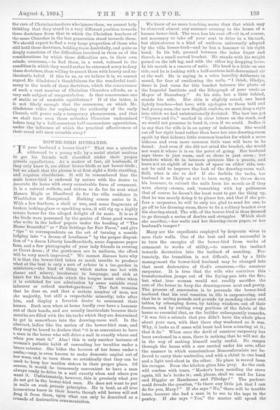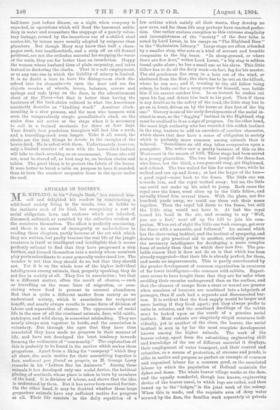BOWER-BIRD HUSBANDS.
" IS your husband a bower-bird P" That was a question addressed to a young wife by a social statist anxious to get his friends well classified under their proper generic appellations. As a matter of fact, all husbands, if they only knew it, are either bower-birds or not bower-birds ; but we admit that the phrase is at first sight a little startling, and requires elucidation. It will be remembered that the male bower-bird is endowed by nature with the desire to decorate its home with every conceivable form of ornament. It is a natural testhete, and strives to do for its nest what Messrs. Maple or Shoolbred do for the villa residence in Wimbledon or Hampstead. Nothing comes amiss to it. With a few feathers, a shell or two, and some fragments of broken looking-glass or sparkling mica, it will rig up a highly ornate bower for the alleged delight of its mate. It is as if the birds were possessed by the genius of those good women who write in the ladies' papers under the heading of "The Rome Beautiful" or "Fair Settings for Fair Faces," and give " tips " to correspondents on the art of turning a seaside lodging into "a dream of loveliness" by the proper disposi- tion of "a dozen Liberty handkerchiefs, some Japanese paper fans, and a few photographs of your lady friends in evening or Court dress ; if the gentlemen are in uniform, the effect will be very much improved." We cannot discuss here why it is that the bower-bird takes so much trouble to produce what at the best is only a sort of arbour in a tea-garden in miniature,—the kind of thing which makes one hot with shame and misery, incoherent in language, and sick at heart for the falsehoods which the tongue must utter when it is exhibited for our admiration by some amiable rural labourer or retired market-gardener. The fact remains that he does so, and that a certain number of men, not the majority, but still a respectable minority, take after him, and display a feverish desire to ornament their homes. Such men when at home hardly ever have a hammer out of their hands, and are usually inarticulate because their mouths are filled with the tin-tacks which they are determined to get in somewhere into the drawing-room wall. In the abstract, ladies like the notion of the bower-bird man, and they may be heard to declare that "it is so convenient to have a man in the house who will drive a nail in exactly where and when you want it." Alas 1 this is only another instance of woman's pathetic habit of concealing her troubles under a brave exterior. She hides the horrors of her home under a smile,—nay, is even known to make domestic capital out of her woes, and to turn them so artistically that they can be used to keep her maiden sisters in their proper place. Of course, it would be immensely convenient to have a man always ready to drive in a nail exactly when and where you want it. Unfortunately however, this is precisely what you do not get in the bower-bird man'. He does not want to put in nails on such .prosaic principles. He is bent, as all true housewives know in their hearts, though wild horses will not drag it from them, upon what can only be described as a crusade of destructive ornamentation. We know of no more touching scene than that which may be observed almost any summer evening in the house of a human bower-bird. The man has his coat off—it is, of course, not necessary to take off your coat to drive in a tin-tack, but shirt-sleeves is a kind of uniform universally adopted by the villa bower-bird—and he has a hammer in his right hand. In his left, pressed between the index finger and thumb, is a small carved bracket. He stands with his weight poised on the left leg, and with the other leg dropping loose. In his mouth is a reserve of nails. His head is a little on one side, and he is looking with a half-anxious half-determined air at the wall. He is saying in a voice horribly deliberate in sound, for fear of swallowing the nails, "I think, Gladys, there is just room for this bracket between the photo of the Imperial Institute and the lithograph of your uncle as Mayor of Danesbury." At his side, but a little behind, stands his wife. Her chin is slightly raised, one hand lightly touches—but here, with apologies to those bold and bad young men, the new English realists, we must drop a style into which we had unintentionally deviated. The bow has got "Ulysses and Co." marked in clear letters on the stock, and we would not presume to bend it, even if we could, Suffice it to say that the wife is in an agony of indecision. She would cut off her right hand rather than have her nice drawing-room spoilt by that hideous little common bracket for which a more hideous and even more common little vase will have to be found. And even if she did not mind the bracket, she would not want it where it is on the point of going. Her husband says there is just room, and so there is just room ; but brackets which fit in between pictures like a puzzle, and leave not an eighth of an inch of space on either side, can- not be said to improve the look of the drawing-room wall. Still, what is she to do P If she forbids the tacks, her husband is as likely as not to turn nasty, to throw down his hammer, to extract the nails from his mouth as if they were cherry - stones, and, 'remarking with icy politeness that of course he doesn't the least want to put the thing tip, that he was merely doing it to please her, and that if she pre- fers a carpenter, he will be only too glad to send for one, to go off to his dressing-room, there to fix a solitary bracket over his shaving-stand. The wife of the bower-bird is thus doomed to go through a series of doubts and straggles. Which shall she sacrifice,—her walls and her drawing-room paper, or her husband's temper ?
Many are the expedients employed by desperate wives to save their walls. One of the best and most successful is to turn the energies of the bower-bird from works of ornament to works of utility,—to convert the instinct towards decoration into the instinct of mending. For- tunately, the transition is not difficult, and by a little management the bower-bird husband may be changed into that most destructive of God's creatures,—the amateur carpenter. It is true that the wife who contrives this transformation jumps out of the frying-pan into the fire; but what true woman would not readily sacrifice the rest of the house to keep the drawing-room neat and pretty. The process of conversion is to persuade the bower-bird husband that his real vocation in life is carpentering, and that he is saving pounds and pounds by mending chairs and tables, by rehanging doors, by taking windows out of their frames, and by cutting away portions of the fabric of the house so essential that, as the builder subsequently remarks, "it was fair a miracle that you didn't have the whole place about your ears, with that there stay weakened as it was. Why, it looks as if some wild beast had been a-tearing at it; that it do." When once the devil of amateur carpentry has been awakened in a man, there is nothing that he will not do in the way of making himself really useful.He ranges through the house with a saw carried under his arm, after the manner in which conscientious Nonconformists are be- lieved to carry their umbrellas, and with a chisel in one hand and a light tool-chest in the other. No place is sacred from his ravages. Even the kitchen gives him prey. As the cook will confess with tears, "Master's been mending the stove again, till he's broke it ; and, please, shall we send for Lion and Higgler or Randsome and Pilledge " The parlour- maid dreads the question, "Is there any little job that I can do for you, Mary P" If she says "No," there will be trouble later, because she had a man in to see to the taps in the pantry. If she says "Yes," the master will spend the half-hour just before dinner, on a night when company is expected, in operations which will flood the basement ankle- deep in water and necessitate the stoppage of a purely volun- tary leakage, caused by the incautious use of a chilled steel centre-bit, by means more usually adopted by surgeons than plumbers. But though Mary may know that half a cham- pagne cork, two handkerchiefs, and a strip off an old flannel petticoat, are not the orthodox material for stopping the water at the main, they are far better than an inundation. Happy the woman whose husband tires of plain carpentry, and takes instead to doctoring the clocks. That is a safe employment, or at any rate one in which the liability of misery is limited. It is no doubt a bore to have the dining-room clock dis- solved into its elements—to open the door and see the disjeeta membra of wheels, levers, balances, screws and springs and rods lying on the floor, in the advertisement sheet of the Times—but that is better than having the banisters of the back-stairs reduced to what the Americans succinctly describe as "kindling wood." Amateur clock- mending is a slow process, and the man who tampers with even the comparatively simple grandfather's clock on the stairs does not arrive at the stage when it is necessary to call in a trained mechanic for three or four days. Your Dent's best pendulum timepiece will last him a week, and a travelling-clock even longer. Take it all round, the clocks are the best things to devote to the energies of the bower-bird. He is safest with them. Unfortunately, however, only a limited number of men with the bower-bird instinct will take to clock-wrecking as an amusement. Those who will not, Mist be staved off, as best may be, on broken chairs and tables. The great thing is to protect the fabric of the house. It were better to break a table on purpose to have it mended, than to turn the amateur carpenter loose in the space under the roof.



































 Previous page
Previous page